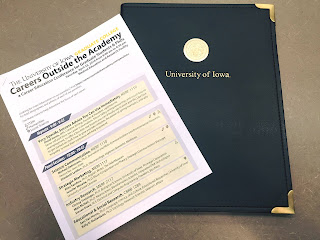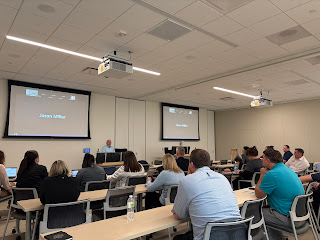Careers Outside the Academy
By: Erin Mobley
The Graduate College hosted Careers Outside the Academy: a Career Education Conference for Masters and Ph.D. students on Saturday, April 23, at the Medical Education and Research Facility on campus. This event was the first of its kind for graduate students at the University of Iowa. Students were able to hear from speakers who successfully made the transition from graduate school to careers outside of academics (a.k.a., the academy), network with attendees and fellow students, and share ideas and experiences to learn from each other. I attended, along with fellow Ph.D. student, Jure Baloh.
The day kicked off with an inspiring keynote address from David Sarco, founder of Lighthaus Inc, who discussed “bite-sized” techniques and lessons to use in both your professional and personal life. Most interesting was the discussion around empathy, using the Bad Day Principle. The idea behind this is that if you take a step outside of what’s going on in your head, you would realize that no one else probably knows that you are having a bad day. Sarco also pointed out that learning to be empathetic towards others is similar to putting together a puzzle – you need to solve the puzzle of what’s going on with those around you to be more empathetic.
Following the keynote address, panel sessions were held, where attendees could choose which panel sessions they would like to attend, based on the topics and panelists. I attended the sessions on Educational and Social Research, Healthcare Management, Communicating Your Research, Subject Matter Specialists, Research Consulting, and Non-Profits. Most interesting of all of the panel sessions was the discussion around Healthcare Management, featuring Mike Demand, Ph.D. Medical Sociology, Vice President of Wellmark, and Catherine Radzewich, Ph.D. Inorganic Chemistry, Senior Project Manager at the University of Iowa Health Care. Mike and Catherine discussed their career paths and how they made the transition from academics to industry. The discussion then changed to answering questions from the audience.
Mike and Catherine both emphasized the importance of having strong organizational skills, marketable skill sets and experiences, and the ability to translate your academic work into words that are understandable to those outside of your field of study. They also discussed how their individual hands-on experiences made them more marketable during the job search process. In terms of goal setting and achieving your goals, Catherine recommended setting specific goals, both personally and professionally, to constantly challenge yourself and make yourself uncomfortable in an effort to grow. Mike emphasized the importance of developing valuable skills, especially communication and relationship-building/networking skills, to help you ultimately achieve your goals. Lastly, both Catherine and Mike advised having a strong mentor who can help you along the path to achieve your goals.
After the session on Healthcare Management, Jure and I had lunch with Mike and Catherine, where the conversation continued to evolve around daily work, work-life balance, advice for Ph.D. students, etc. Having the time to informally talk with both panelists was invaluable.
 The afternoon group session was focused on Communicating Your Research, and was led by Amy Ruth and David McGraw, husband and wife, and both faculty at the University of Iowa. This session was quite entertaining and interactive, where Amy Ruth and David discussed the importance of knowing the space that you will be presenting in, including lighting, presentation logistics such as background colors, font, text size, and even color of your clothing chosen for
The afternoon group session was focused on Communicating Your Research, and was led by Amy Ruth and David McGraw, husband and wife, and both faculty at the University of Iowa. This session was quite entertaining and interactive, where Amy Ruth and David discussed the importance of knowing the space that you will be presenting in, including lighting, presentation logistics such as background colors, font, text size, and even color of your clothing chosen for
your presentation. They also chatted about the physical nature of your presentation, meaning where to stand, when to walk or move, how to stand, etc. Lastly, they focused on the importance of voice during your presentation. They suggested using a microphone (whenever possible), clearly articulating your words, and practicing your presentation at a speed that seems slower than ideal because your cadence will speed up as you present (especially if you are presenting to an audience that is not as familiar with your topic). Amy Ruth and David even have their own company called Your Classroom, Your Stage, which helps faculty and graduate students learn techniques to effectively engage and present their information to their students or peers.
Overall, Careers Outside the Academy was a great success! I learned a great deal about how to market myself, specific skills to highlight, networking strategies, how to effectively communicate my research to both lay and expert audiences, and the importance of setting and achieving goals personally and professionally. I would recommend attending this session to both Ph.D. and Masters level students.
The Graduate College hosted Careers Outside the Academy: a Career Education Conference for Masters and Ph.D. students on Saturday, April 23, at the Medical Education and Research Facility on campus. This event was the first of its kind for graduate students at the University of Iowa. Students were able to hear from speakers who successfully made the transition from graduate school to careers outside of academics (a.k.a., the academy), network with attendees and fellow students, and share ideas and experiences to learn from each other. I attended, along with fellow Ph.D. student, Jure Baloh.
The day kicked off with an inspiring keynote address from David Sarco, founder of Lighthaus Inc, who discussed “bite-sized” techniques and lessons to use in both your professional and personal life. Most interesting was the discussion around empathy, using the Bad Day Principle. The idea behind this is that if you take a step outside of what’s going on in your head, you would realize that no one else probably knows that you are having a bad day. Sarco also pointed out that learning to be empathetic towards others is similar to putting together a puzzle – you need to solve the puzzle of what’s going on with those around you to be more empathetic.
Following the keynote address, panel sessions were held, where attendees could choose which panel sessions they would like to attend, based on the topics and panelists. I attended the sessions on Educational and Social Research, Healthcare Management, Communicating Your Research, Subject Matter Specialists, Research Consulting, and Non-Profits. Most interesting of all of the panel sessions was the discussion around Healthcare Management, featuring Mike Demand, Ph.D. Medical Sociology, Vice President of Wellmark, and Catherine Radzewich, Ph.D. Inorganic Chemistry, Senior Project Manager at the University of Iowa Health Care. Mike and Catherine discussed their career paths and how they made the transition from academics to industry. The discussion then changed to answering questions from the audience.
Mike and Catherine both emphasized the importance of having strong organizational skills, marketable skill sets and experiences, and the ability to translate your academic work into words that are understandable to those outside of your field of study. They also discussed how their individual hands-on experiences made them more marketable during the job search process. In terms of goal setting and achieving your goals, Catherine recommended setting specific goals, both personally and professionally, to constantly challenge yourself and make yourself uncomfortable in an effort to grow. Mike emphasized the importance of developing valuable skills, especially communication and relationship-building/networking skills, to help you ultimately achieve your goals. Lastly, both Catherine and Mike advised having a strong mentor who can help you along the path to achieve your goals.
After the session on Healthcare Management, Jure and I had lunch with Mike and Catherine, where the conversation continued to evolve around daily work, work-life balance, advice for Ph.D. students, etc. Having the time to informally talk with both panelists was invaluable.
 The afternoon group session was focused on Communicating Your Research, and was led by Amy Ruth and David McGraw, husband and wife, and both faculty at the University of Iowa. This session was quite entertaining and interactive, where Amy Ruth and David discussed the importance of knowing the space that you will be presenting in, including lighting, presentation logistics such as background colors, font, text size, and even color of your clothing chosen for
The afternoon group session was focused on Communicating Your Research, and was led by Amy Ruth and David McGraw, husband and wife, and both faculty at the University of Iowa. This session was quite entertaining and interactive, where Amy Ruth and David discussed the importance of knowing the space that you will be presenting in, including lighting, presentation logistics such as background colors, font, text size, and even color of your clothing chosen foryour presentation. They also chatted about the physical nature of your presentation, meaning where to stand, when to walk or move, how to stand, etc. Lastly, they focused on the importance of voice during your presentation. They suggested using a microphone (whenever possible), clearly articulating your words, and practicing your presentation at a speed that seems slower than ideal because your cadence will speed up as you present (especially if you are presenting to an audience that is not as familiar with your topic). Amy Ruth and David even have their own company called Your Classroom, Your Stage, which helps faculty and graduate students learn techniques to effectively engage and present their information to their students or peers.
Overall, Careers Outside the Academy was a great success! I learned a great deal about how to market myself, specific skills to highlight, networking strategies, how to effectively communicate my research to both lay and expert audiences, and the importance of setting and achieving goals personally and professionally. I would recommend attending this session to both Ph.D. and Masters level students.




Comments
Post a Comment